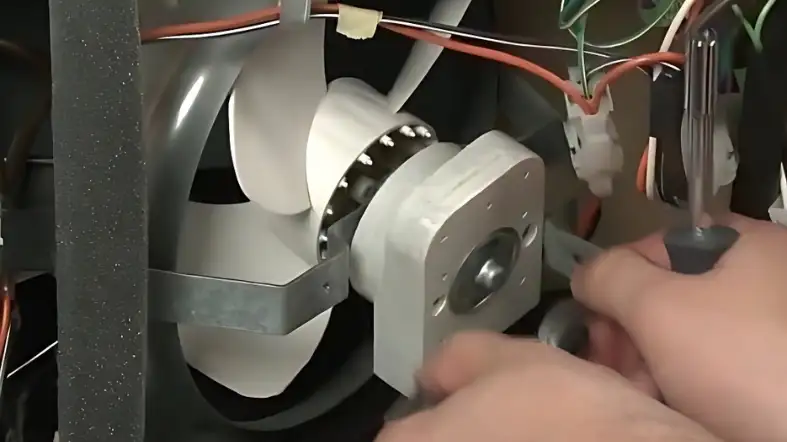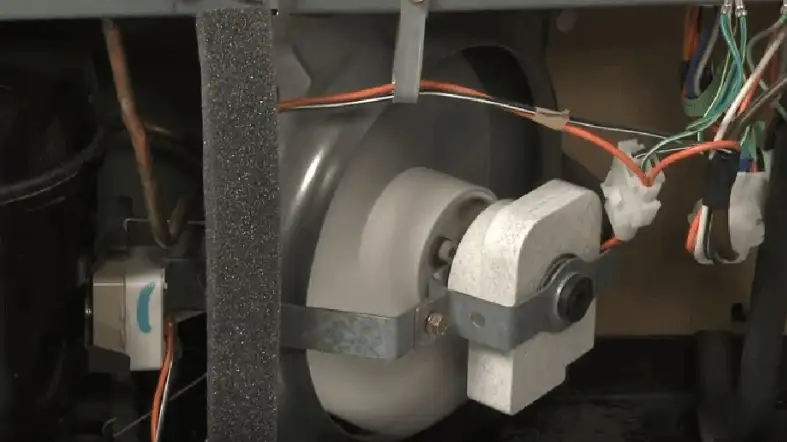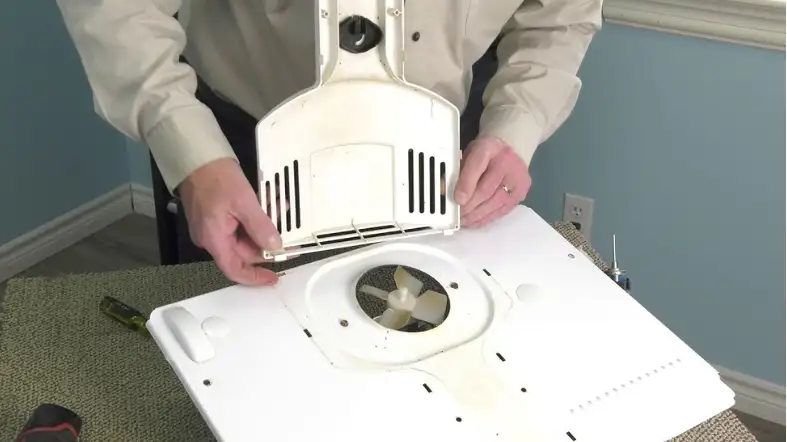Frigidaire Refrigerator Evaporator Fan Motor Noise: Fixing Guide
We may earn affiliate fees for purchases using our links (at no additional cost to you).
Is the constant noise coming from your Frigidaire refrigerator’s evaporator fan motor driving you crazy?
Wondering what could be causing it and how to fix the issue? Look no further!
In this article, we’ll explore the reasons behind the evaporator fan motor noise in Frigidaire refrigerators and provide you with practical solutions to restore peace and quiet to your kitchen.

Why does frigidaire the refrigerator evaporator fan motor make a noise?
The Frigidaire refrigerator evaporator fan motor makes noise due to various reasons, such as worn-out bearings, ice buildup, or a faulty motor.
Regular maintenance, cleaning, or replacing the fan motor can help resolve the issue and restore a quiet operation.
Causes of Evaporator Fan Motor Noise in Frigidaire Refrigerators
When your Frigidaire refrigerator’s evaporator fan motor starts making noise, it can be quite frustrating.
Understanding the causes behind this noise is crucial to resolving the issue. Here are some common culprits:
1. Worn-out Bearings:
Over time, the bearings in the fan motor can wear down, leading to a noisy operation. This can result from regular wear and tear or lack of lubrication.
2. Ice Buildup:
Excessive ice buildup around the fan blades can cause them to scrape against the ice, producing a rattling or grinding noise. This can occur due to improper defrosting or a faulty defrost system.
3. Faulty Motor:
A malfunctioning fan motor itself can also be the source of the noise. This can be caused by motor damage, loose parts, or electrical issues.
4. Fan Blade Issues:
Misaligned or damaged fan blades can create noise when they come into contact with other components or when spinning at high speeds.
The Impact of Evaporator Fan Motor Noise on Refrigerator Performance

When your refrigerator’s evaporator fan motor is noisy, it can have a significant impact on its overall performance.
Understanding how this noise affects your appliance is essential for addressing the issue effectively. Here’s what you need to know:
1. Compromised Cooling Efficiency:
The noise produced by a malfunctioning fan motor can disrupt the airflow inside the refrigerator.
This disturbance can result in uneven cooling, leading to inconsistent temperature levels throughout the appliance.
As a result, your food may not stay fresh as long, and certain areas of the fridge may become warmer than desired.
2. Increased Energy Consumption:
When the fan motor operates noisily, it indicates that it’s not functioning optimally.
This inefficiency can cause the motor to work harder than necessary, consuming more energy.
As a consequence, your electricity bills may rise, impacting your monthly expenses.
3. Excessive Wear and Tear:
The noise emitted by the fan motor can be a sign of underlying mechanical issues.
Continuous operation with a noisy motor can lead to increased wear and tear on the motor and other components.
This can accelerate the rate of deterioration and potentially result in costly repairs or the need for a replacement.
4. Disturbing Noise Levels:
The constant noise from the fan motor can be a source of annoyance and discomfort in your home.
It may disrupt the peaceful atmosphere, especially if your kitchen or living area is nearby.
Additionally, it can make conversations challenging or interfere with your ability to concentrate.
Troubleshooting Evaporator Fan Motor Noise in Frigidaire Refrigerators

Follow these troubleshooting steps to identify and resolve the issue:
1. Unplug and Inspect:
Start by unplugging your refrigerator from the power source for safety. Carefully remove the back panel to access the evaporator fan motor.
Check for any visible obstructions, such as ice buildup or debris, around the fan blades.
2. Defrost the Freezer:
If you notice ice accumulation around the fan blades, it’s crucial to defrost the freezer.
Empty the contents of the freezer, and place towels inside to absorb any water.
Leave the freezer door open for a few hours until the ice melts completely. Once defrosted, clean up any excess water.
3. Lubricate the Bearings:
Worn-out or dry bearings can cause noisy fan motor operation. If accessible, locate the bearings and apply a few drops of lubricating oil to them.
This can help reduce friction and noise. Be cautious not to over-lubricate, as it may lead to further issues.
4. Check the Motor Mounting:
Inspect the motor mounting bracket and screws. If they are loose or damaged, tighten or replace them as necessary.
A secure motor mounting ensures stable operation and minimizes vibrations that can contribute to noise.
5. Test the Fan Motor:
Plug your refrigerator back in and turn it on. Observe the fan motor’s performance. If the noise persists, the motor may be faulty and require replacement.
Contact a professional technician to handle motor replacement, as it can be a complex task.
Steps to Repair or Replace the Evaporator Fan Motor in a Frigidaire Refrigerator

Here are the steps you can take to repair or replace the fan motor and restore a peaceful kitchen:
1. Unplug and Access the Fan Motor:
Ensure your refrigerator is safely disconnected from the power source. Remove the back panel or access panel to expose the evaporator fan motor.
Take a moment to familiarize yourself with the motor’s location and wiring.
2. Disconnect the Wiring:
Carefully disconnect the wiring harness or terminals connecting the fan motor to the refrigerator. Take note of the connections to ensure correct reinstallation later.
3. Remove the Fan Blade:
The fan blade is typically secured to the motor shaft with a retaining clip or screw.
Gently remove the clip or unscrew it to detach the fan blade from the motor. Set the blade aside for now.
4. Remove the Faulty Motor:
Depending on the model, the fan motor may be held in place with screws or brackets. Remove these fasteners and carefully pull out the motor from its housing.
Pay attention to any wires or additional components that may be attached.
5. Install the Replacement Motor:
If you’re replacing the motor, align the new motor with the housing and secure it in place using the screws or brackets. Ensure a snug fit without over-tightening.
6. Reattach the Fan Blade:
Place the fan blade back onto the motor shaft, aligning it properly. Use the retaining clip or screw to secure it firmly. Make sure the blade is balanced and rotates freely.
7. Reconnect the Wiring:
Refer to the notes or labels you made earlier and reconnect the wiring harness or terminals to the corresponding connections on the new motor. Double-check that the connections are secure.
8. Test the Operation:
Plug your refrigerator back in and turn it on. Listen for any unusual noise or vibrations. Verify that the new fan motor is functioning correctly and the noise issue has been resolved.
Tips for Preventing Evaporator Fan Motor Noise in Frigidaire Refrigerators
To maintain a peaceful and well-functioning Frigidaire refrigerator, here are some valuable tips to prevent evaporator fan motor noise:
1. Regular Cleaning:
Keep the refrigerator’s interior clean and free from debris. Wipe down the fan blades and motor housing periodically to remove dust or accumulated dirt that can interfere with smooth operation.
2. Adequate Clearance:
Ensure proper clearance around the refrigerator to allow sufficient airflow.
Avoid placing items too close to the vents or obstructing the fan motor, as this can restrict air circulation and contribute to noise generation.
3. Leveling the Appliance:
Check that your refrigerator is level using a bubble level. Adjust the leveling feet or use shims to ensure even weight distribution.
This step helps prevent vibrations and unnecessary strain on the fan motor, reducing the likelihood of noise.
4. Optimal Temperature Settings:
Set your refrigerator to the recommended temperature range specified by the manufacturer.
Extreme temperatures can affect the motor’s performance and lead to excessive noise. Maintain consistent and appropriate cooling levels.
5. Regular Defrosting:
Prevent excessive ice buildup by regularly defrosting the freezer compartment. Follow the manufacturer’s guidelines for defrosting frequency and duration.
Excessive ice can strain the fan motor, causing noise and reduced efficiency.
6. Lubrication:
If your fan motor has accessible bearings, consider lubricating them with a few drops of lubricating oil as recommended by the manufacturer.
This helps reduce friction and potential noise caused by dry or worn-out bearings.
7. Gentle Door Handling:
Avoid slamming or forcefully closing the refrigerator doors. Handle them gently to prevent unnecessary vibrations that can impact the fan motor’s stability and contribute to noise generation.
8. Routine Maintenance:
Schedule periodic maintenance checks for your refrigerator. Engage a professional technician to inspect and service your appliance regularly.
They can identify any potential issues, including fan motor problems, and address them promptly.
FAQs
1. How Can I Defrost The Freezer To Reduce Fan Motor Noise?
2. What Can I Do If The Fan Motor Noise Persists After Defrosting?
3. Can A Noisy Fan Motor Affect The Refrigerator’s Cooling Performance?
4. How Often Should I Clean The Fan Blades And Motor?
5. Is There A Way To Prevent Evaporator Fan Motor Noise In Frigidaire Refrigerators?
Additionally, scheduling routine maintenance checks can help identify and address any potential issues before they escalate.
Conclusion
Say goodbye to the annoyance of a noisy Frigidaire refrigerator evaporator fan motor.
By understanding the causes and taking proactive steps, you can restore peace and quiet to your kitchen.
Regular cleaning, defrosting, and proper maintenance will keep the fan motor running smoothly.
If the noise persists, consult a professional technician for expert assistance. Enjoy a serene and efficient refrigerator experience with Frigidaire’s quiet and high-performing appliances.